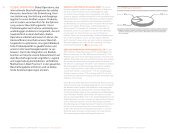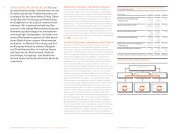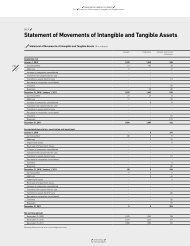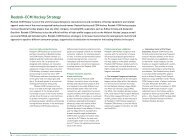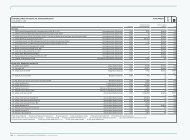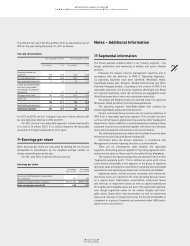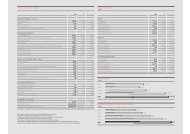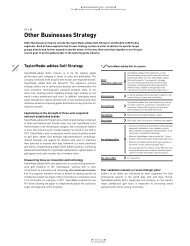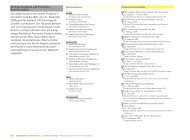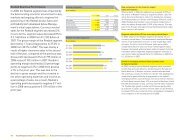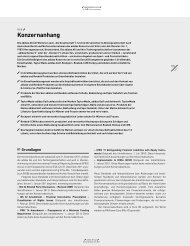You also want an ePaper? Increase the reach of your titles
YUMPU automatically turns print PDFs into web optimized ePapers that Google loves.
customer and range segmentation<br />
to drive effectiveness<br />
Rolling out standardised product<br />
range packages around the globe is an<br />
important part of the Group’s wholesale<br />
<strong>strategy</strong>. The initiative, which was first<br />
designed and implemented in Europe,<br />
involves a customer segmentation<br />
<strong>strategy</strong> that facilitates the systematic<br />
allocation of differentiated product packages<br />
to groups of comparable customers.<br />
This segmentation is broadly based on a<br />
distinction between sports and lifestyle<br />
retailers that either have an up-market<br />
“brand-driven” positioning or a valueoriented<br />
“commercial” positioning. By<br />
best suiting their specific needs, this<br />
provides <strong>Global</strong> Sales a platform to<br />
better exploit market potential, while at<br />
the same time supporting the reduction<br />
of complexity and costs. In addition,<br />
Wholesale continues to partner with<br />
retailers on increasing the level and<br />
quality of sell-through information the<br />
Group receives. This creates a mutually<br />
beneficial understanding of their needs<br />
that will help the Group become a more<br />
valuable and reliable business partner to<br />
our retailers, driving incremental business<br />
opportunities.<br />
retail space management to<br />
drive efficiency<br />
Retail Space Management (RSM) comprises<br />
all business models helping <strong>Global</strong><br />
Sales to expand controlled space in retail.<br />
The Wholesale function is cooperating<br />
with retailers along the entire supply<br />
chain to bring best-in-class service all<br />
the way through to the point of sale. By<br />
helping to improve the profitability per<br />
square metre for the Group’s retail partners<br />
as well as improving product availability,<br />
we can achieve higher customer<br />
satisfaction, thus driving share of retail<br />
shelf space.<br />
The three predominant models to<br />
drive the success of RSM for the adidas<br />
Group are Never-out-of-stock, FLASH<br />
collections and Franchising.<br />
never-out-of-stock (noos): The NOOS<br />
programme comprises a core range<br />
of basic articles, mostly on an 18 – 24<br />
months lifecycle, that are selling across<br />
all channels and markets. Overall, the<br />
NOOS replenishment model secures high<br />
levels of product availability throughout<br />
the season, allowing for quick adaptation<br />
to demand patterns. Retailers have to<br />
provide dedicated retail space, co-invest<br />
in fixtures and fittings and commit to a<br />
“first fill” representing about 25% of total<br />
expected seasonal demand to participate<br />
in this programme. In return, customers<br />
can profit from significantly reduced<br />
inventory risk on these products. Most<br />
NOOS articles are on an end-to-end<br />
supply chain, thus limiting the adidas<br />
Group’s inventory risk as we re-produce<br />
following customer demand.<br />
FlasH collections: The FLASH programme<br />
consists of pre-defined collection<br />
packages that are delivered every<br />
4 – 6 weeks to retailers’ doors, including<br />
basic point-of-sale promotional materials<br />
to promote dedicated retail space<br />
provided by the retailer. All articles of the<br />
FLASH packages are exclusively developed<br />
for this programme with the intention<br />
to bring freshness to the retail space.<br />
With a short development lead time, we<br />
are able to reflect recent product and<br />
colour trends in the FLASH range. As no<br />
samples are available during sell-in, the<br />
customers buy into a business proposition<br />
rather than traditionally selecting<br />
individual articles. In return for this<br />
commitment, the retailers have the right<br />
to selectively return articles of every<br />
FLASH collection that have not sold out<br />
during the defined retail window. Overall,<br />
the FLASH programme helps to improve<br />
brand image while limiting inventory<br />
risk for the customers. The FLASH programme<br />
has been started in 2010, with<br />
full-scale rollout planned from 2012<br />
onwards.<br />
Franchising: Mono-branded store<br />
franchising is one of the Group’s prime<br />
growth opportunities, as it offers superior<br />
brand presentation. Franchise stores are<br />
financed and operated by franchise partners.<br />
The adidas Group normally contributes<br />
to the costs for brand- specific<br />
fixtures and fittings each store has to be<br />
equipped with.<br />
Further, we support our franchise<br />
partners with a comprehensive franchise<br />
concept, including range propos itions,<br />
IT systems, training concepts, and<br />
guidelines for store building and store<br />
operations. This ensures that the quality<br />
of the brand presentation and the service<br />
offered to the consumer are at all times<br />
high and comparable to our own retail<br />
stores.<br />
Harmonisation and standardisation<br />
of processes to exploit leverage<br />
While understanding that market and<br />
consumer needs require differentiated<br />
distribution policies, the establishment<br />
of the <strong>Global</strong> Sales function is also an<br />
enabler to further leverage the size of<br />
our Group and reduce complexity by<br />
implementing best operational practices<br />
across our wholesale activities. The harmonisation<br />
and standardisation particularly<br />
of back-end processes can help to<br />
further reduce cost through simplified<br />
IT systems and applications. Similarly,<br />
and already started in Europe, we are<br />
rolling out a trade terms policy that<br />
rewards customer performance either<br />
by higher efficiency (e.g. in logistics) or<br />
better sell-out support (e.g. by point-ofsale<br />
activation). As part of this effort we<br />
will harmonise trade terms definitions,<br />
and we have established regular reporting,<br />
delivering meaningful benchmarks<br />
that allow us to tightly control our<br />
investments.<br />
GrouP manaGEmEnt rEPort – our GrouP <strong>Global</strong> Sales Strategy 55



